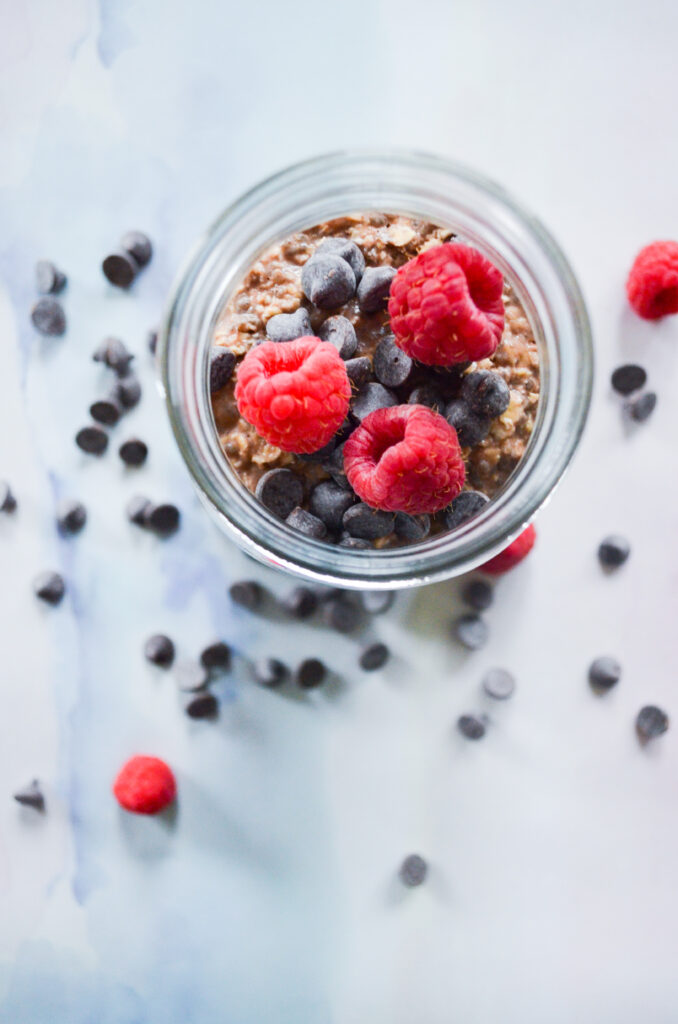There is so much misinformation around the topic of sugar and gut health, and which foods in general negatively impact gut health. I am regularly asked “is sugar bad for gut health?” by clients. The belief that sugar negatively impacts gut health perpetuates the vilification of sugar, and carbohydrates in general, by the media. The fact is, sugar in moderation isn’t ‘bad’ for gut health, and whole food sources of sugar like fruits actually have many gut health benefits. Read on to learn more about sugar and gut health, whether unrefined sugar is better than refined sugar, and the connection between sugar substitutes and gut health!
Sugar and Gut Health: Is Sugar Bad for Gut Health?
In simple terms, no sugar (in moderation) is not inherently bad for gut health, and the negative impact of sugar on gut health by the media has been exaggerated. Sugar is typically digested higher up in the GI tract and therefore doesn’t reach most of our gut microbes. However, there are some concerns around excessive sugar intake and gut health. In fact, high sugar diets have been shown to impact the composition of the gut microbiota and potentially promote inflammation (1). Keep in mind that diets high in unrefined sugar and processed foods are typically low in fiber and plant foods, which we know are the key components of a gut healthy diet. And natural sugars from whole food sources, such as fruit, are high in both fiber and polyphenols – both of which are gut health superstars. Ultimately, you can rest assured that consuming sugar is not going to destroy your gut microbiota. Focus instead on consuming a primarily whole food diet high in a wide variety of plant foods, and don’t worry about the occasional sweet treat!
Are Unrefined Sugars Better Than Refined Sugars?
Agave nectar, honey, and coconut sugar are often seen as healthy alternatives to the well-established “villain” of white sugar. There are so many different types and classifications of sugar that it can be very confusing trying to figure out what it all means. The common belief is that unrefined sugars are more natural and therefore more healthy. But do unrefined sugars deserve their better reputation?

What is Sugar?
Sugar is simply a type of carbohydrate that has a sweet taste. Sugars can be naturally occurring or added. You may refer to certain carbohydrates referred to as ‘simple sugars’, while other carbohydrates are known as ‘complex carbohydrates’. Examples of simple sugars include fruit, dairy, lower fiber grains (i.e. white bread, white rice, potatoes, white pasta etc.), table sugar, sweetened beverages, baked goods, sweets, candy and chocolate. Whereas complex carbohydrates are higher fiber whole grains such as whole wheat bread, brown rice, quinoa, sweet potatoes and beans and legumes. In general, we want to focus primarily on including complex carbohydrates in our diet, although this does not apply to fruit or unsweetened dairy products.
A few other common terms related to sugar that you may have heard of are free sugars, added sugar and refined sugar. Free sugars are any sugars that have been added to food or drinks, as well as sugars naturally present in honey, syrups and unsweetened fruit juices. Added sugar references any sugar added to food products during processing. Refined sugars are sugars that have been processed into a simple sugar that can be added to food products, such as high fructose corn syrup (HFCS) and table sugar.

What Is Unrefined Sugar?
Unrefined sugar refers to sugars that are naturally occurring in foods. Common examples include honey, maple syrup, agave nectar and coconut sugar.
The use of the term ‘unrefined sugar’ has become very common in wellness space. I frequently see diet and fitness influencers talking about unrefined sugars and using them in their cooking and baking. The concern with labelling food products and recipes as containing ‘no unrefined sugars’ is that there is an implication that the food product is healthier or low in sugar, which is not necessarily the case.
Unrefined sugars often fall into the ‘free sugar’ category as they are being added into baked goods or food products. Unrefined sugars taste sweet because they contain simple sugars, which are processed the exact same way as refined sugars. Basically, to the body, sugar is sugar.
Are There Any Benefits to Unrefined Sugars?
Although unrefined sugars are essentially identical in terms of how much glucose is provided to the body, there may be small benefits to choosing these sugars more often. I am a huge promoter of choosing whole foods whether possible. Compared to a highly processed sugar such as high fructose corn syrup, I would recommend choosing an unrefined sugar when possible. Additionally, unrefined sugars can contain more nutrients, especially minerals as compared with refined sugars. However, it is important to remember that the amount of these nutrients is often negligible in very small portion sizes. Unrefined sugars contain a very similar amount of calories to refined sugars.
Coconut sugar is essentially dehydrated sap of the coconut palm tree. It is processed in a way that preserves some nutrients, including iron, zinc, calcium, potassium, and some antioxidants. Another benefit of coconut sugar is that it increases blood sugar slightly less than white sugar because of its inulin fiber component. Although it has more nutrients and fibre than white sugar, the difference is minimal. A sugar swap would not cause a substantial change in health.
Honey has slightly more antioxidants than agave nectar, but they both contain trivial amounts. Maple syrup does contain several important nutrients, including riboflavin, manganese, and zinc. Again, portion size should be considered. A 2 tablespoon portion contains the daily values of 50% manganese and 19% riboflavin.
The most important question may be which choice will lead you to consume the least amount of free sugar overall? Honey, maple syrup, and agave nectar are denser in sugar than white sugar, so you need less volume for the same sweetness. However, are you going to be able to actually decrease the volume of a sweetener used?
Switching to an unrefined sugar likely offers no significant benefit.

What Is The Recommended Amount of Sugar?
There is a lot of discussion surrounding recommendations for the amount of daily sugar intake. Various groups and health organizations have provided different recommendations, which I have listed below. Although the quantities vary slightly, the consistent messaging is to limit free/added sugars and focus on a primarily whole foods diet.
Health Canada does not provide a specific recommendation for daily intake of sugar at the present time. Instead, Health Canada recommends a “healthy eating pattern where most sugars come from fruit, vegetables and unsweetened dairy products such as plain milk or yogurt. Other sources of sugars can increase calories without benefiting our health.”
Health Canada also recently introduced food labelling changes to help Canadians understand the sugars content of their food. The food industry has until 2022 to meet the new regulations. There is now a % Daily Value (DV) for total sugars on nutrition labels. The % DV for the amount of total sugars in the nutrition facts table is based on 100 grams. Per Health Canada, “this value is not a recommended level of intake. Instead it is the amount of total sugars that is consistent with a healthy eating pattern. That is, a diet where sugars come mostly from fruit, vegetables and plain milk.”
Diabetes Canada recommends Canadians:
- Limit their intake of free sugars to less than 10% of total daily calorie (energy) intake. This is approximately 50 grams (12 teaspoons) of free sugars consumption per day based on a 2000-calorie diet
- Limit intake of sugar sweetened beverages (SSB) and drink water in their place
- Promote the intake of whole foods and reduce the intake of free sugars throughout life for overall health
Heart & Stroke recommends you consume no more than 10% total calories per day from added sugars, and ideally less than 5%; that is, for an average 2,000 calorie-a-day diet, 10% is about 48 grams (or 12 teaspoons) of added sugars
The World Health Organization (WHO) and UK government recommend limiting free sugar intake to less than 5% of daily energy. For those 11 years old and older this works out as roughly 7 sugar cubes/teaspoons of sugar per day or 30g of sugar.
The American Heart Association recommends limiting added sugars to no more than 6 percent of calories each day. For most American women, that’s no more than 100 calories per day, or about 6 teaspoons of sugar. For men, it’s 150 calories per day, or about 9 teaspoons. The AHA recommendations focus on all added sugars, without singling out any particular types such as high-fructose corn syrup
What Are the Risks of Consuming Too Much Sugar?
Excess consumption of sugars is concerning from a health perspective. High consumption of free and added sugars often contributes to excessive calorie intake which is associated with increased risk of overweight and obesity as well as other lifestyle-related chronic diseases such as type 2 diabetes, certain types of cancer and cardiovascular disease. Diets that are high in sugar, sodium and saturated fat are one of the top risk factors for chronic diseases.
Processed sugar products (such as juice, pop, baked goods, etc.) tend to raise blood sugars more significantly than unprocessed foods (fruit, oatmeal, etc.). This dramatic blood sugar spike can lead to organ damage in the liver or the pancreas over prolonged periods of time.
Conclusion
The takeaway? Your body does not recognize “natural” (unrefined) sugar as any different from processed (refined) sugar. Unrefined sugars may have a slight advantage due to less processing and containing additional components such as vitamins and minerals, but it is important to remember that the volume contributed by a small portion size is typically insignificant. There is not a conclusive recommendation for intake of sugar at the present time, but the general consensus is to limit added and free sugars and focus on consuming whole foods (instead of processed) whenever possible.



Leave a Reply